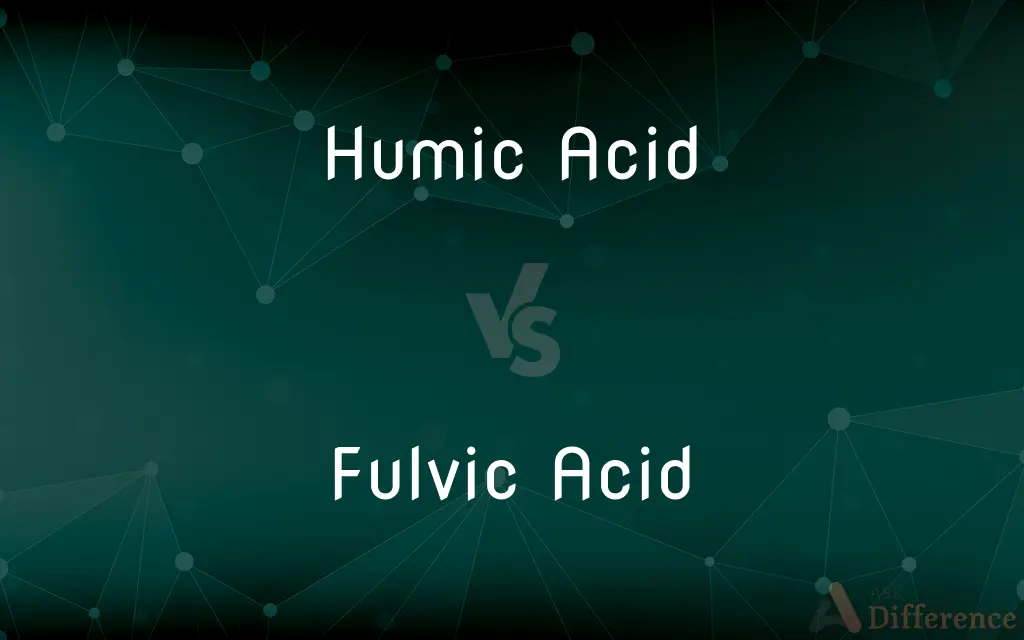Humic Acid vs. Fulvic Acid — What's the Difference?
Edited by Tayyaba Rehman — By Fiza Rafique — Published on November 25, 2023
Humic Acid is a dark organic compound formed from plant and microbial decomposition; Fulvic Acid is its lighter, more soluble counterpart.

Difference Between Humic Acid and Fulvic Acid
Table of Contents
ADVERTISEMENT
Key Differences
Humic Acid and Fulvic Acid are two distinct fractions of humic substances, vital components in the soil, peat, coal, and bodies of freshwater. Humic Acid, known for its dark color, is formed from the chemical breakdown of plants and microbial materials over time. In contrast, Fulvic Acid is the lighter fraction of these organic substances and is known for its higher solubility in water compared to Humic Acid.
In the realm of organic chemistry, both Humic Acid and Fulvic Acid play pivotal roles in soil fertility and plant health. Humic Acid, being less soluble, predominantly remains in soil, aiding in retaining water, improving soil structure, and promoting microbial activity. Fulvic Acid, being more soluble, easily travels through the soil, aiding nutrient uptake in plants.
While both acids originate from the same sources, their solubilities in different pH values set them apart. Humic Acid is soluble in higher pH (alkaline) conditions, whereas Fulvic Acid remains soluble across a broader pH range. This solubility trait of Fulvic Acid makes it a preferred choice in certain agricultural practices.
The molecular size also differentiates Humic Acid and Fulvic Acid. Fulvic Acid molecules are smaller and possess a higher oxygen content than those of Humic Acid. This means that Fulvic Acid can chelate, or bind, to minerals and nutrients more effectively, making them bioavailable to plants.
Conclusively, both Humic Acid and Fulvic Acid are imperative for soil health and plant growth. They share a common origin but differ in solubility, molecular size, and their roles in soil and agriculture.
ADVERTISEMENT
Comparison Chart
Color
Dark.
Light to amber.
Solubility in Water
Less soluble.
Highly soluble across different pH levels.
Molecular Size
Larger molecules.
Smaller molecules.
Oxygen Content
Lower oxygen content.
Higher oxygen content.
Role in Agriculture
Improves soil structure, retains water.
Facilitates nutrient uptake in plants.
Compare with Definitions
Humic Acid
A dark organic compound resulting from decomposed plants and microbes.
By adding Humic Acid to the soil, farmers can enhance its water retention capacity.
Fulvic Acid
The more reactive and soluble counterpart of Humic Acid.
The presence of Fulvic Acid can improve a plant's resistance to stress.
Humic Acid
An essential element in improving soil's physical properties.
The addition of Humic Acid can aid in mitigating soil compaction issues.
Fulvic Acid
A light-colored organic material, highly soluble in water, derived from plant and microbial decay.
Farmers often use Fulvic Acid supplements to enhance plant nutrient absorption.
Humic Acid
The less soluble fraction of organic material in soil.
The dark color of certain soils is due to the presence of Humic Acid.
Fulvic Acid
An organic acid beneficial for soil health and plant growth.
Fulvic Acid is considered a vital ingredient in some organic fertilizers.
Humic Acid
An organic acid formed from prolonged decomposition.
Humic Acid has been studied for its potential effects on plant growth.
Fulvic Acid
A component of humic substances with a broad pH solubility range.
Due to its solubility, Fulvic Acid can transport minerals to plant roots effectively.
Humic Acid
A component of humic substances found in soil and water.
Humic Acid plays a role in promoting beneficial microbial growth in soil.
Fulvic Acid
The fraction of humic substances with smaller molecular size.
Fulvic Acid's small molecular size makes it effective in chelating nutrients.
Common Curiosities
Can Fulvic Acid enhance plant nutrient uptake?
Yes, its chelating ability makes nutrients more bioavailable to plants.
What are Humic Acid and Fulvic Acid derived from?
Both are derived from the decomposition of plant and microbial materials.
Can Humic Acid improve soil structure?
Yes, Humic Acid can enhance soil structure and water retention.
Why is Fulvic Acid more soluble than Humic Acid?
Due to its smaller molecular size and higher oxygen content.
Are both acids found in all soils?
While present in most soils, their concentrations can vary based on organic material and decomposition.
Are there any commercial applications for Humic Acid?
Yes, it's used in agriculture, horticulture, and as a supplement in some cases.
How do these acids impact soil pH?
While they can influence pH, their primary role is in nutrient availability and soil structure.
Are both acids beneficial for all plants?
Generally, yes, but specific benefits can vary based on plant type and soil conditions.
Can these acids be artificially manufactured?
They are primarily derived from natural sources, though some synthesized products are available.
Can excessive amounts of Fulvic Acid harm plants?
Overuse can lead to imbalances in soil nutrients, potentially impacting plants.
Do these acids impact microbial life in soil?
Yes, they can promote beneficial microbial activity.
Are there health benefits to consuming Fulvic Acid?
Some claim health benefits, but research is ongoing.
Share Your Discovery

Previous Comparison
Protein vs. Calories
Next Comparison
Subsidiary vs. AssociateAuthor Spotlight
Written by
Fiza RafiqueFiza Rafique is a skilled content writer at AskDifference.com, where she meticulously refines and enhances written pieces. Drawing from her vast editorial expertise, Fiza ensures clarity, accuracy, and precision in every article. Passionate about language, she continually seeks to elevate the quality of content for readers worldwide.
Edited by
Tayyaba RehmanTayyaba Rehman is a distinguished writer, currently serving as a primary contributor to askdifference.com. As a researcher in semantics and etymology, Tayyaba's passion for the complexity of languages and their distinctions has found a perfect home on the platform. Tayyaba delves into the intricacies of language, distinguishing between commonly confused words and phrases, thereby providing clarity for readers worldwide.
















































